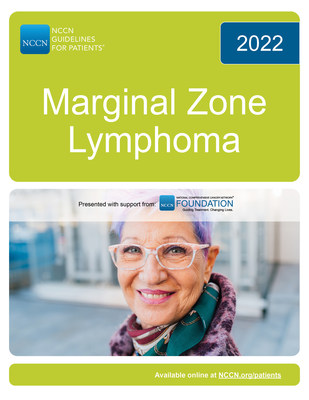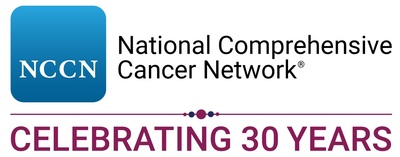
An evidence-based, expert consensus resource, available for free at NCCN.org/patientguidelines, helps people understand a rare and complex cancer type
PLYMOUTH MEETING, Pa., Sept. 12, 2022 /PRNewswire/ -- The National Comprehensive Cancer Network (NCCN) has published new NCCN Guidelines for Patients: Marginal Zone Lymphoma. A cancer of the lymphatic system, marginal zone lymphoma (MZL) is a type of non-Hodgkin B-cell lymphoma that is typically slow-growing, and comprises about 8% of non-Hodgkin lymphoma cases1.

"As a result of its rarity, many people lack awareness of Marginal Zone Lymphoma. During the diagnosis phase, patients should consider the possibility of having their pathology reviewed at a medical center that sees a lot of lymphoma patients, in order to confirm the diagnosis" according to Leo I. Gordon, MD, Professor in Medicine, Northwestern University Feinberg School of Medicine and the Robert H. Lurie Comprehensive Cancer Center; Dr. Gordon is Vice-Chair of the panel that develops the NCCN Clinical Practice Guidelines in Oncology (NCCN Guidelines) for B-Cell Lymphomas, which include Marginal Zone Lymphoma.
NCCN Guidelines are the recognized standard for clinical direction and policy in cancer management; NCCN Guidelines for Patients take the same evidence-based clinical recommendations and present them in simple, easy-to-understand wording, alongside charts, images, and suggested questions to ask.
The patient guidelines for Marginal Zone Lymphoma guidelines are the latest in NCCN's library of NCCN Guidelines for Patients, published through funding from the NCCN Foundation and available online free of charge. NCCN Guidelines for Patients provide information on nearly 60 cancer types, as well as topics such as treatment side effect management, mental distress, and survivorship. With this new guide, patients can understand the distinctive features of MZL, which can be lost in discussions of slow-growing (or "indolent") lymphomas in general.
MZL develops from immune cells called B cells. That meant management for MZL was particularly impacted during the early days of the COVID-19 pandemic, since some treatment options can reduce B-cell-produced antibodies, thereby lessening the overall immune system response. Now that providers can manage COVID-19 more effectively, MZL patients are less vulnerable to poor outcomes from infection.
MZL is generally diagnosed in people in their late 50s through mid-60s, although it can occur in the skin of persons as young as 20 to 30 years of age. It is often a chronic, non-fatal disease.
There are three main subtypes of MZL based on where they originated in the body, either in the spleen, bone marrow, or in lymphatic tissues throughout the body. "MZL can be extranodal, which can involve virtually any organ in the body, including skin, stomach, lung, prostate, or breast," said Andrew D. Zelenetz, MD, PhD, Medical Oncologist, Memorial Sloan Kettering Cancer Center; Chair, NCCN Guidelines Panel for B-Cell Lymphomas "Splenic MZL involves the spleen, blood, and bone marrow, and is sometimes associated with hepatitis C infection. And nodal MZL primarily forms in the lymph nodes. All three subtypes are managed differently."
Treatments are trending away from cytotoxic chemotherapy and toward more targeted chemotherapy and immunotherapy, with clinical trials using chimeric antigen receptor (CAR) T-cell therapy underway.
Dr. Gordon noted that "not everyone needs treatment right away, many people can be safely observed and spared unnecessary treatment-related toxicity."
NCCN Guidelines for Patients are available for free online at NCCN.org/patientguidelines and via the NCCN Patient Guides for Cancer App. Printed versions can be purchased through Amazon for a nominal fee.
Patients and advocates are eligible for complimentary admission to an upcoming NCCN event focused on the latest blood cancer treatment recommendations. The NCCN 2022 Annual Congress: Hematologic Malignancies will take place in New York City on October 14-15 as a hybrid event with the option to attend in-person or virtually. Visit NCCN.org/hem for more information.
About the National Comprehensive Cancer Network
The National Comprehensive Cancer Network (NCCN) is a not-for-profit alliance of leading cancer centers devoted to patient care, research, and education. NCCN is dedicated to improving and facilitating quality, effective, efficient, and accessible cancer care so patients can live better lives. The NCCN Clinical Practice Guidelines in Oncology (NCCN Guidelines) provide transparent, evidence-based, expert consensus recommendations for cancer treatment, prevention, and supportive services; they are the recognized standard for clinical direction and policy in cancer management and the most thorough and frequently updated clinical practice guidelines available in any area of medicine. The NCCN Guidelines for Patients provide expert cancer treatment information to inform and empower patients and caregivers, through support from the NCCN Foundation. NCCN also advances continuing education, global initiatives, policy, and researchcollaboration and publication in oncology. Visit NCCN.org for more information and follow NCCN on Facebook @NCCNorg, Instagram @NCCNorg, and Twitter @NCCN.
About the NCCN Foundation
The NCCN Foundation was founded by the National Comprehensive Cancer Network (NCCN) to empower people with cancer and advance oncology innovation. The NCCN Foundation empowers people with cancer and their caregivers by delivering unbiased expert guidance from the world's leading cancer experts through the library of NCCN Guidelines for Patients and other patient education resources. The NCCN Foundation is also committed to advancing cancer treatment by funding the nation's promising young investigators at the forefront of cancer research. For more information about the NCCN Foundation, visit NCCN.org/foundation.
1 Khalil MO, Morton LM, Devesa SS, Check DP, Curtis RE, Weisenburger DD, Dores GM. Incidence of marginal zone lymphoma in the United States, 2001-2009 with a focus on primary anatomic site. Br J Haematol. 2014 Apr;165(1):67-77. doi: 10.1111/bjh.12730. Epub 2014 Jan 12. PMID: 24417667; PMCID: PMC3967856.
Media Contact:
Rachel Darwin
267-622-6624
darwin@nccn.org

Photo - https://mma.prnewswire.com/media/1895713/mzl.jpg
Logo - https://mma.prnewswire.com/media/441768/NCCN_Logo.jpg

